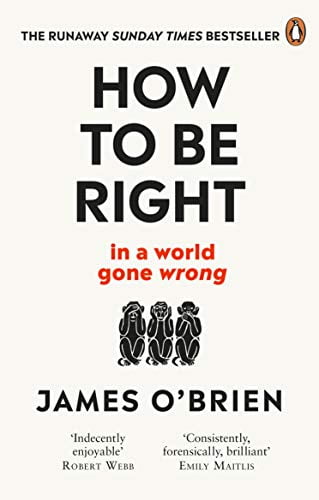I dissect the famous quote about how Americans don’t support social welfare policies because they see themselves as “temporarily embarrassed millionaires”, and how that mindset can be dangerous.
I’ve been reading a fascinating book by the British radio show host James O’Brien. It’s called “How To Be Right…In A World Gone Wrong“.

In it, he uses his powers of inquiry to show not only what he believes about the controversial topics of the day in British life (Brexit, political correctness, multiculturalism) but also tries to unpack the views that many people espouse without actually being able to defend them.
Even if you aren’t as fascinated by the slow-motion-car-crash of Brexit as I am, it’s a good read, and it even deals with plenty of U.S.-relevant topics too.
But there was a quoted phrase in there that gave me pause and led me to wonder if there’s a novel reason why we don’t support policies that would lift us all out of financial distress and make life easier for all of us.
And I wonder if you’re guilty of thinking it too.

Table of Contents
Temporarily embarrassed millionaires
Here’s a quote from the book, in the chapter on “Nanny States and Classical Liberals”
Proponents of “nanny state” rhetoric…generally fall into two categories. First, those “third basers”, the beneficiaries of entrenched and inherited inequality who seek to persuade themselves and others that these inequalities are not only justified but also somehow natural…Second, the constituency of people on the wrong side of the inequality who support the structure in the almost always mistaken belief that they might somehow end up among the “winners”. They’re best described in another American adage, often wrongly attributed to John Steinbeck, which describes poor people who “see themselves not as an exploited proletariat but as temporarily embarrassed millionaires.”
Leaving Steinbeck out of it for now, let’s talk about the “temporarily embarrassed millionaires”.
It consistently perplexes me how, in the face of such yawning inequality in our society, when most people count as part of the “have-nots”, we don’t advocate for greater redistribution from the “haves” in order to fund plainly non-egregious safety net services for everyone.
For example, people in the pandemic have been railing on about how the “lockdowns” cause even more suffering than the pandemic itself, presumably due to the economic and emotional damage caused by closed businesses and lost jobs.
Putting aside the over 200,000 deaths in our country alone (and counting), if people who lost their jobs were able to receive some form of basic income, and if we were able to prop needy business up with some economic relief, don’t you think that there would be less suffering?
I find that people who aren’t worried about food and housing tend to be less terrified of ongoing adversity.
Also, if we didn’t tie our health care to our jobs, then we wouldn’t be so terrified of losing our jobs.
That there is no economic relief in sight for my country is due almost entirely to an idea that the government has given out “too much already” and that the best way to provide relief is to just let things return to normal.
And if you die? Well, you had weak genes or something.
Rich, just without any money
People vote in their own best interests, so supporting free market, make-money-at-all-costs-and-screw-everyone-else policies only makes sense if you believe that someday, you won’t be the person getting screwed.
But back to the temporarily embarrassed millionaires. The idea that those people who would benefit from government-based assistance being in opposition to such gains can only make sense under a few conditions.
One, obviously, is racism. In short: “I’d rather not receive help if it would also help them.”
The other possibility is more interesting: the idea that those who are on the wrong side of economic inequality feel like that this is not where they naturally belong. That prosperity is their due, and that they are just hitting a temporary snag along the way.
I think this idea has legs. After all, people vote in their own best interests, so supporting free market, make-money-at-all-costs-and-screw-everyone-else policies only makes sense if you believe that someday, you won’t be the person getting screwed.
But this is an illusion, and if we have any hope creating a reasonably equal economic playing field for everyone, we need to convince people that they are most likely not going to be a millionaire because of free market policies.
Misplaced faith
Sure, you might become a millionaire based primarily on financial discipline, investment consistency, and values from your upbringing, as The National Study of Millionaires states as what millionaires believe leads to wealth. But it would be much easier if you also didn’t have to be terrified of losing your health care if you lost your job, and be forced out on the streets if a once-in-a-century pandemic takes your livelihood away.
I believe that we all need to become millionaires. But why make it more difficult than we need to? It’s hard enough as it is.
Americans seem to have more faith in upward economic mobility than nearly anyone. as suggested in Jacobin. Whether this optimism is misplaced or not is an open question. But the above-linked article does go on to posit that maybe the driver of resistance to equitable redistribution of wealth may not be as inherent as we might think. Maybe this narrative is stoked by those who currently stand the most to lose from from it.
All the more reason for us to question, as James O’Brien does on his radio show, why people believe what they do.
A note on the quote itself
Misquotes have lives on their own. “Play it again, Sam” is one of the most famous quotes in all of movie history, but it never appears in Casablanca.
The Steinbeck misquote was due to Canadian author Ronald Wright. In his book A Short History of Progress, he writes:
John Steinbeck once said that socialism never took root in America because the poor see themselves not as an exploited proletariat but as temporarily embarrassed millionaires. This helps explain why American culture is so hostile to the idea of limits, why voters during the last energy shortage rejected the sweater-wearing Jimmy Carter and elected Ronald Reagan, who scoffed at conservation and told them it was “still morning in America.” Nowhere does the myth of progress have more fervent believers.
Steinbeck never said this. What he wrote, in the article “A Primer on the 30’s” for Esquire in 1960, was as follows:
[M]ost of the so-called Communists I met were middle-class, middle-aged people playing a game of dreams. I remember a woman in easy circumstances saying to another even more affluent: “After the revolution even we will have more, won’t we, dear?”…
I guess the trouble was that we didn’t have any self-admitted proletarians. Everyone was a temporarily embarrassed capitalist.
What is interesting about this quote is that it says something entirely different about communism (a.k.a. socialism) than what Ronald Wright implies.
Steinbeck is saying that many people of comfortable means were drawn to communism in the 1930’s, thinking that it would help elevate their situation, but that deep down, they still believed in the standard American order of capitalism. I believe he is positing that this is why communism never quite got off the ground.
This is entirely different from what Ronald Wright is getting at.
However, I believe Ronald Wright is correct too, even though his source is wrong. American exceptionalism, that most dangerous nationalistic arrogance, also implies personal exceptionalism. “I will become a millionaire just because I’m an American.”
But it’s not bravado and confidence that makes someone become wealthy. It’s the circumstances that someone is born into, mixed with patience, knowledge, tenacity, and luck. Only some of those things are controllable by us.
So do some introspection, and ask yourself: do you believe that you will be wealthy because your hard work and patience will pay off, or do you believe that you will be well-off because it’s your destiny?
Because if it’s the latter, you may risk becoming permanently embarrassed.


